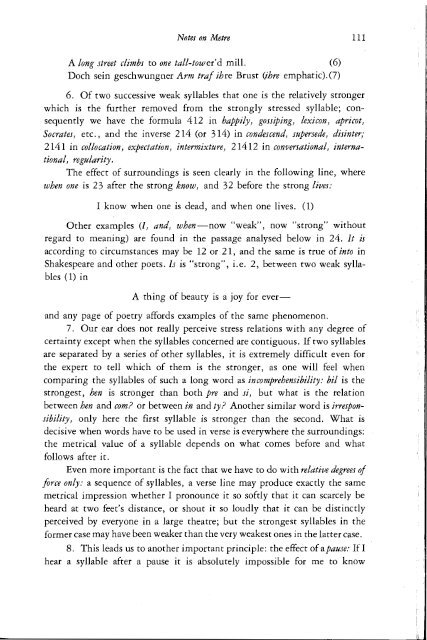OTTO JESPERSEN Notes on Metre - UMR 7023
OTTO JESPERSEN Notes on Metre - UMR 7023
OTTO JESPERSEN Notes on Metre - UMR 7023
Create successful ePaper yourself
Turn your PDF publications into a flip-book with our unique Google optimized e-Paper software.
<str<strong>on</strong>g>Notes</str<strong>on</strong>g> <strong>on</strong> <strong>Metre</strong><br />
A l<strong>on</strong>g street climbs to <strong>on</strong>e tall-tower'd mill. (6)<br />
Doch sein geschwungner Arm traf ih re Brust (ihre emphatic). (7)<br />
6. Of two successive weak syllables that <strong>on</strong>e is the relatively str<strong>on</strong>ger<br />
which is the further removed from the str<strong>on</strong>gly stressed syllable; c<strong>on</strong>sequently<br />
we have the formula 412 in happily, gossiping, lexic<strong>on</strong>, apricot,<br />
Socrates, etc., and the inverse 214 (or 314) in c<strong>on</strong>descend, supersede, disinter,.<br />
2141 in collocati<strong>on</strong>, expectati<strong>on</strong>, intermixture, 21412 in c<strong>on</strong>versati<strong>on</strong>al, internati<strong>on</strong>al,<br />
regularity.<br />
The effect of surroundings is seen clearly in the following line, where<br />
when <strong>on</strong>e is 23 after the str<strong>on</strong>g know, and 32 before the str<strong>on</strong>g lives:<br />
I know when <strong>on</strong>e is dead, and when <strong>on</strong>e lives. (1)<br />
Other examples (I, and, when-now "weak", now "str<strong>on</strong>g" without<br />
regard to meaning) are found in the passage analysed below in 24. It is<br />
according to circumstances may be 12 or 21, and the same is true of into in<br />
Shakespeare and other poets. Is is "str<strong>on</strong>g", i.e. 2, between two weak syllables<br />
(1) in<br />
A thing of beauty is a joy for ever-<br />
and any page of poetry affords examples of the same phenomen<strong>on</strong>.<br />
7. Our ear does not really perceive stress relati<strong>on</strong>s with any degree of<br />
certainty except when the syllables c<strong>on</strong>cerned are c<strong>on</strong>tiguous. If two syllables<br />
are separated by a series of other syllables, it is extremely difficult even for<br />
the expert to tell which of them is the str<strong>on</strong>ger, as <strong>on</strong>e will feel when<br />
comparing the syllables of such a l<strong>on</strong>g word as incomprehensibility: bil is the<br />
str<strong>on</strong>gest, hen is str<strong>on</strong>ger than both pre and si, but what is the relati<strong>on</strong><br />
between hen and com? or between in and ty? Another similar word is irresp<strong>on</strong>sibility,<br />
<strong>on</strong>ly here the first syllable is str<strong>on</strong>ger than the sec<strong>on</strong>d. What is<br />
decisive when words have to be used in verse is everywhere the surroundings:<br />
the metrical value of a syllable depends <strong>on</strong> what comes before and what<br />
follows after it.<br />
Even more important is the fact that we have to do with relative degrees of<br />
force <strong>on</strong>ly: a sequence of syllables, a verse line may produce exactly the same<br />
metrical impressi<strong>on</strong> whether I pr<strong>on</strong>ounce it so softly that it can scarcely be<br />
heard at two feet's distance, or shout it so loudly that it can be distinctly<br />
perceived by every<strong>on</strong>e in a large theatre; but the str<strong>on</strong>gest syllables in the<br />
former case may have been weaker than the very weakest <strong>on</strong>es in the latter case.<br />
8. This leads us to another important principle: the effect of a pause: If I<br />
hear a syllable after a pause it is absolutely impossible for me to know<br />
111

















